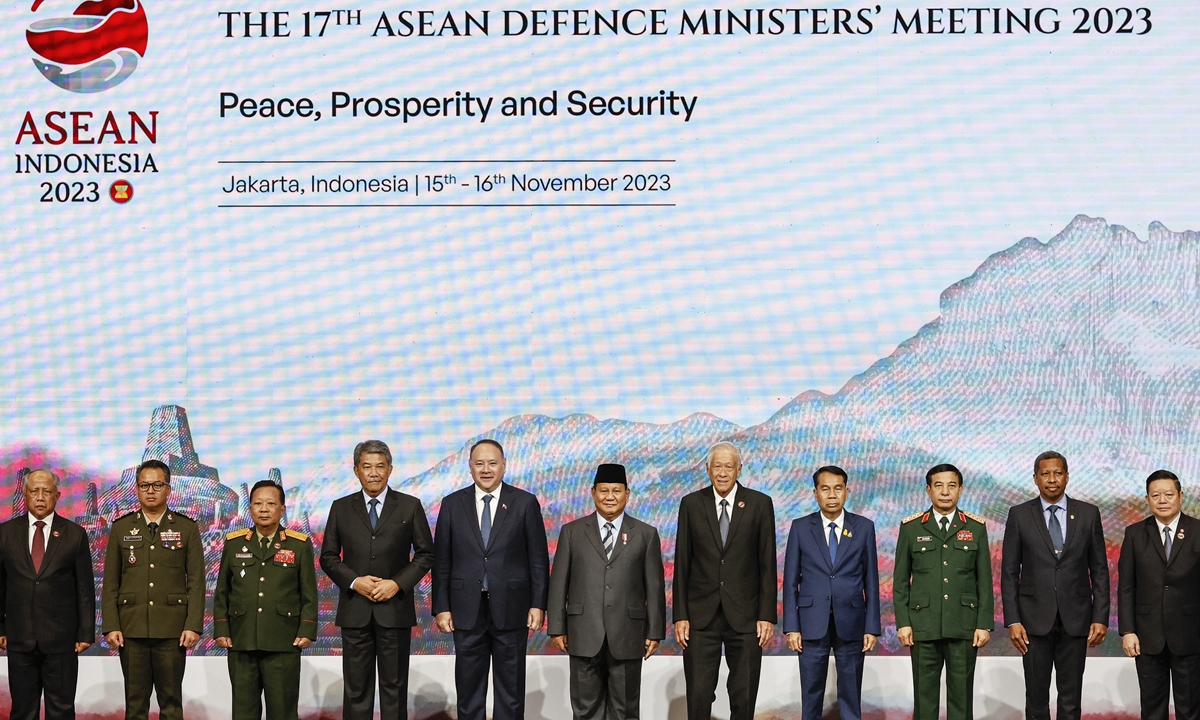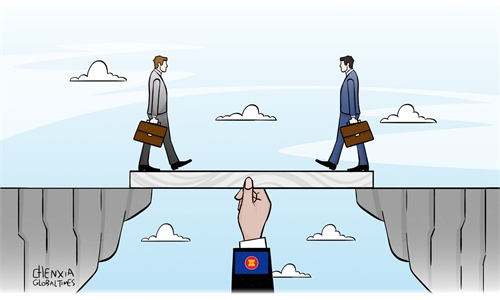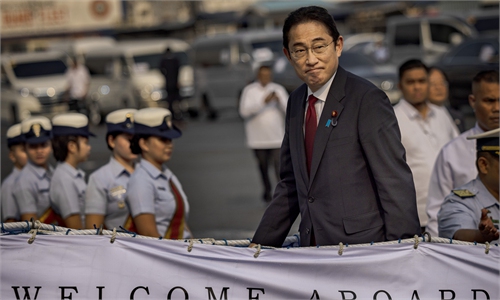US continues to woo allies as ASEAN defense chiefs affirm regional peace, stability

The Association of Southeast Asian Nations (ASEAN) Defense Ministers Meeting in Jakarta, Indonesia,on November 15 Photo: VCG
While defense chiefs from ASEAN members underscored the importance of maintaining regional peace and stability, and called for pursuing peaceful solutions to disputes during the ASEAN Defense Ministers' Meeting (ADMM) in Jakarta, the US continued to promote its "Indo-Pacific" strategy and vowed military support to allies on the sidelines of the ADMM events.
Chinese experts said ASEAN's voice shows its pursuit is completely different from the US' "Indo-Pacific" strategy, and that the vast majority of ASEAN members are willing to work together with China to build the region into a peaceful and prosperous one, rather than introducing US' bloc confrontation and repeating the tragedy of the Ukraine crisis.
Under the theme "Peace, Prosperity and Security," defense ministers from ASEAN member states discussed the dynamic of geopolitics and defense cooperation in Indonesia on Wednesday. The ADMM-Plus, a platform for ASEAN and its eight dialogue partners including Australia, China, India, Japan, South Korea, Russia and the US, kicked off on Thursday.
In a joint statement released after the ADMM, ministers agreed to deepen defense and security cooperation among its members and between the association and its partner countries. Ministers also reiterated the commitment of all parties to "cooperating in a constructive and peaceful manner," making the South China Sea "a sea of peace, stability and prosperity."
The statement said ASEAN has noted the geopolitical and geostrategic dynamic shift in the region and the impacts of "major power rivalry" that could threaten stability and peace. In terms of disputes in the South China Sea, ministers agreed to pursue peaceful solutions in accordance with international law.
Senior Colonel Zhang Xiaogang, a spokesperson of China's Ministry of National Defense, said in a press release Thursday that during the ADMM, the Chinese side called on all parties to practice genuine multilateralism, uphold a correct concept of security, insist on peaceful consultations and refrain from conflict and confrontation, so as to assume responsibility for the peaceful development of the world.
China and ASEAN countries have long maintained good-neighborly relations, cooperated in building the Belt and Road Initiative, actively engaged in military cooperation, and jointly maintained overall stability in the South China Sea, Zhang said.
China firmly supports ASEAN's central position in the regional framework, and stands ready to work with the ADMM-Plus members for joint development and cooperation, so as to make positive contributions to regional peace and tranquility, he noted.
Li Haidong, a professor at the China Foreign Affairs University, told the Global Times on Thursday that the Asia-Pacific region is at a crossroads between moving toward fragmentation or continued integration and inclusive development.
The joint statement reflects the unquestionable preference of ASEAN countries for a stable environment that ensures the indivisibility of prosperity, closer economic integration and security for all countries in the region, Li said.
On the sideline of the ADMM-Plus, US Defense Secretary Lloyd Austin met with Philippine Secretary of National Defense Gilberto Teodoro Jr in Jakarta on Thursday. Austin said the US commitment to defending the Philippines' sovereignty is "ironclad." The two officials criticized China in recent South China Sea disputes, and reaffirmed shared vision of "a free and open Indo-Pacific."
The regional peace and stability pursued by the ASEAN members is completely different from the concept and practice of the "free and open Indo-Pacific" advocated by the US, which aims to create divisions and bloc confrontation.
ASEAN members are willing to work with China to make the region a place of peace, prosperity and hope, Li said. "They do not want a new Cold War, let alone replicate the Ukraine crisis in the region."
The Philippines' approach of introducing the US into the region and acting as a US proxy for it is not welcome among other ASEAN members, and it is clear that the Philippines is alone on this issue, Li remarked.
"Without peace and stability, it is impossible to attract investment, promote trade or ensure the well-being of our peoples and societies," Indonesian Defense Minister Prabowo Subianto stressed during the gathering, according to media reports.



